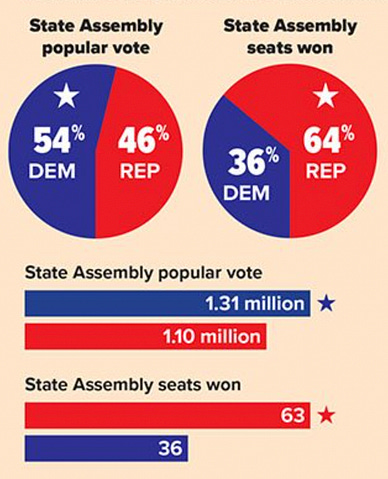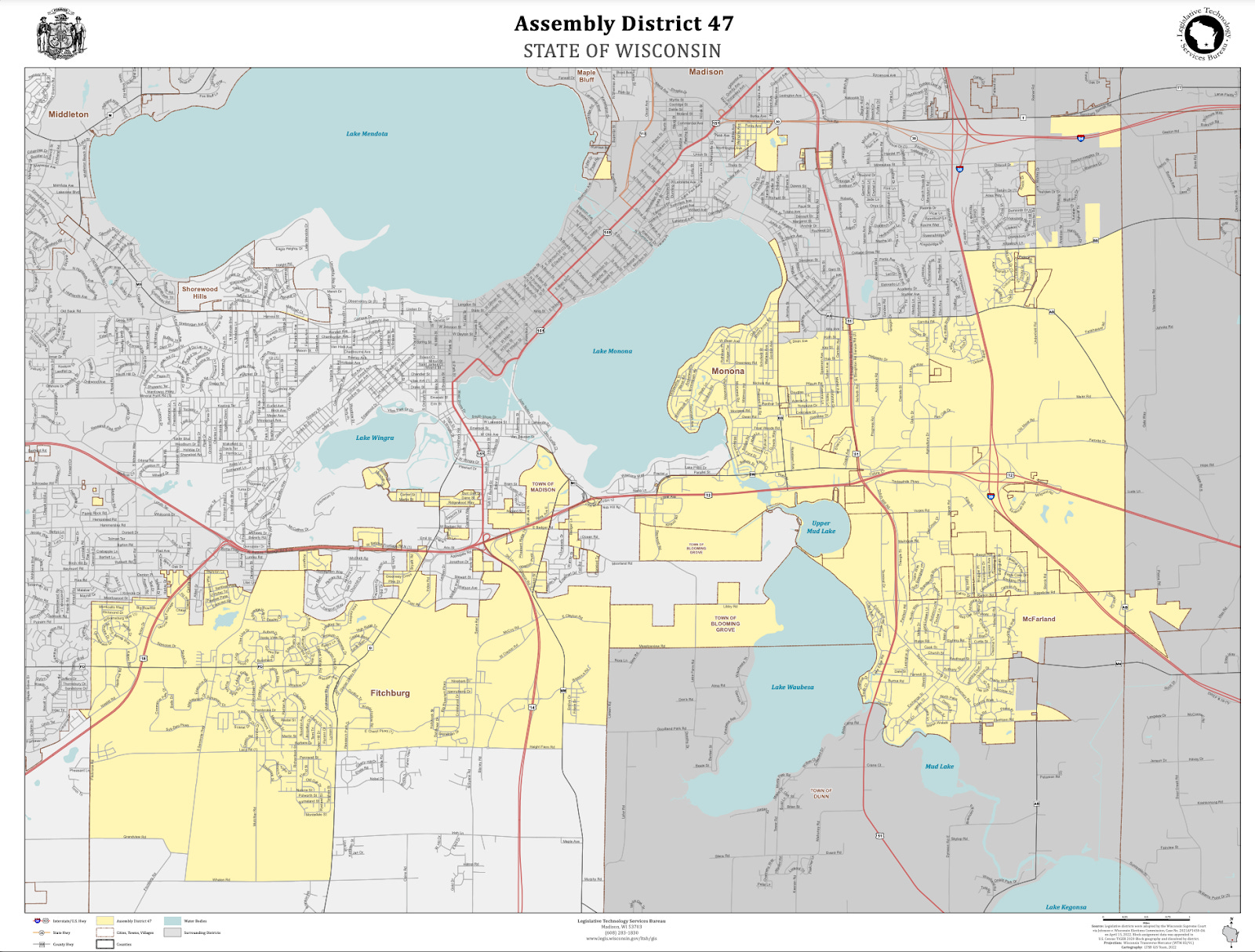Popular Information - Wisconsin Republicans' nuclear option
Since our founding in 2018, about half of our subscribers have found out about this newsletter through Twitter. Today, thanks to Elon Musk, Twitter no longer exists. It's now called "X." And it's less of a social network than a breeding ground for right-wing ideology and conspiracy theories. As a result, the future growth of Popular Information is in doubt. Popular Information can adapt to this new reality and continue to thrive, but we need your help. We have 281,000 readers, but only a small percentage are paid subscribers. If more readers upgrade to paid, Popular Information can invest in alternative growth strategies and produce more accountability journalism that rattles the cages of the rich and powerful. In April, Janet Protasiewicz was elected to the Wisconsin Supreme Court with more than one million votes, defeating her conservative opponent by a wide margin. Her victory tipped the balance of the court, and the new liberal majority will soon review a case, Clarke v. Wisconsin Elections Commission, that could overturn the state’s heavily gerrymandered, Republican-drawn legislative maps. Protasiewicz was sworn in on August 1. But now, before Protasiewicz has had an opportunity to rule on a single case, Wisconsin Republicans are threatening to impeach her. At issue are Protasiewicz's comments during her successful campaign, in which she described the maps as “rigged,” saying that they “do not reflect people in this state.” Those comments have already been subject to a number of complaints by the Republican Party of Wisconsin and others to the Wisconsin Judicial Commission, alleging Protasiewicz violated the judicial code of ethics. In May, the Commission dismissed those complaints, finding that Protasiewicz's comments during the campaign did not violate ethics rules. Republicans also object to campaign contributions that Protasiewicz received from the Democratic Party. Assembly Speaker Robin Vos (R), who was one of the first to float the idea of impeachment, says that the $10 million contribution from the Democratic Party confirms that “Protasiewicz and the Democratic Party 'are one and the same.'" Republicans in the legislature have vowed to remove Protasiewicz from office unless she recuses herself from gerrymandering cases. If Protasiewicz were to recuse, the court would likely stalemate on the issue, locking in the existing maps. Protasiewicz could be impeached by a simple majority of the Wisconsin Assembly, a body where Republicans dominate. Conviction and removal in the Wisconsin Senate would require a two-thirds majority — but Republicans control exactly 22 of the body's 33 seats. Even if Protasiewicz was ultimately not convicted by the Wisconsin Senate, she would have to recuse herself from cases until the trial was completed. Republicans and conservative members of the court used to have a much different view on recusal. In 2007, Wisconsin Manufacturers & Commerce (WMC), the state’s largest business lobbying group, spent an “estimated $2.2 million” to help elect (now-Chief) Justice Annette Ziegler. That year, Ziegler sat alongside her colleagues on “a high-profile sales tax case” involving the WMC and refused to step down despite facing criticism. The court ruled 4-3 “in favor of WMC’s position,” and Ziegler wrote the majority decision. No Republicans called for Ziegler's impeachment. Ziegler did this again in 2009: she refused to recuse herself from a case with broad implications for WMC. This time, she was joined by former Wisconsin Supreme Court Justice Michael Gableman, who declined to step down from the case despite receiving $1.8 million from WMC. That same year, WMC proposed a rule to ensure the members of the court it helped elect could still hear its cases. WMC proposed that judges would "not be required to step aside from cases involving groups or individuals no matter how much they spent to help their campaigns.” The rule was narrowly approved by a vote of 4-3 of the court. Ziegler and Gableman voted in favor. In 2017, a group of 54 retired Wisconsin judges petitioned the court to “adopt a rule requiring judges and justices to recuse from matters involving individuals and entities who financially supported their campaigns.” But the state’s conservative majority, which included Ziegler and another justice, Rebecca Bradley, shot the proposal down. Bradley criticized the petition for “its disregard for the Wisconsin Constitution and the United States Constitution, particularly the First Amendment.” And yet, on August 15, Bradley publicly criticized Protasiewicz for failing to recuse herself from the gerrymandering case because she accepted money from the Democratic Party:
Bradley did not mention that she received $70,000 from the Wisconsin Republican Party — a group that benefits from the existing maps — in support of her campaign. Another conservative justice, Brian Hagedorn, received $150,000. Vos and other Republicans are not demanding Bradley and Hagedorn recuse themselves from the gerrymandering case. And they are not threatening to impeach the pair if they fail to recuse. Why Wisconsin Republicans are so desperate to keep their gerrymandered mapsGerrymandering is not unique to Wisconsin. But, for more than a decade, Wisconsin Republicans have gerrymandered the state's legislative maps so aggressively that it is effectively impossible for Democrats to gain control of the state legislature. In 2018, for example, Democrats swept statewide contests for Governor, Attorney General, U.S. Senate, State Treasurer and Secretary of State. That year, 54% of Wisconsin voters selected a Democrat to represent them in the state assembly, with Democratic candidates collecting 200,000 more votes than Republican candidates. And yet, Republicans won 63 of 99 seats in the state assembly — nearly a two-thirds majority. In 2022, it was a similar story. The statewide electorate was closely divided, with incumbent Governor Tony Evers (D) and incumbent U.S. Senator Ron Johnson (R) both narrowly winning reelection. But Republicans won 64 seats in the state assembly and 22 of 33 state senate seats. How did Republicans create a map that could produce such lopsided results? First, they engaged in traditional gerrymandering practices like "cracking" and "packing." In some cases, blocks of Democratic voters are "cracked" into many different pieces to dilute their voting power. For example, Milwaukee County, a Democratic stronghold, is split among 21 different legislative districts. When "cracking" isn't feasible, Democratic voters are "packed" into districts with as few Republicans as possible so Republican voters can be used to gain control of other districts. But the maps created by Wisconsin Republicans go even further to reduce Democratic voting power. Take, for example, District 47, a Madison-area district that is not only oddly shaped but contains "a host of disconnected pieces scattered across Dane County." Some residents of District 47, "must cross two other assembly districts before reaching another part of their district." In the map below, all areas shaded in yellow are part of District 47: According to the lawsuit filed challenging the state senate and assembly maps, this is not an anomaly. Across the state, "A remarkable 55 assembly districts, consisting of between 2 and 40 disconnected pieces of territory, and 21 senate districts, consisting of between 2 and 34 disconnected pieces of territory, are noncontiguous." While Republicans are claiming Protasiewicz is unacceptably partisan, only a Wisconsin Supreme Court Justice completely blinded by partisanship would uphold non-contiguous districts as legal. The Wisconsin Constitution requires that assembly districts "assembly districts shall be 'bounded by county, precinct, town or ward lines, to consist of contiguous territory and be in as compact form as practicable' and that senate districts must be composed of whole assembly districts and must consist of 'contiguous territory.'" As it stands, a "majority of the current legislative districts… violate these constitutional commands." |
Older messages
The key to understanding Donald Trump's enduring appeal is Vince McMahon
Monday, September 11, 2023
Some people don't want to believe it, but it's true: Donald Trump has a reasonable chance of being elected the next president of the United States. According to conventional political analysis,
Pennsylvania school district requires social studies classes to incorporate right-wing propaganda
Thursday, September 7, 2023
Last Monday, the Pennridge School Board, located outside of Philadelphia, imposed a new social studies curriculum that will require teachers to incorporate lessons from the 1776 Curriculum, a
The truth about Elon Musk and anti-Semitism
Wednesday, September 6, 2023
Elon Musk, a self-proclaimed "free speech absolutist," is threatening to sue the Anti-Defamation League (ADL) for billions of dollars because the group has publicly criticized his management
Disney tickets, PS5s, and big-screen TVs: Florida parents exploit DeSantis' school vouchers
Tuesday, September 5, 2023
Florida parents are taking advantage of an expanded school voucher program championed by Governor Ron DeSantis (R), according to messages from private Facebook groups obtained by Popular Information.
Top North Carolina judge faces potential sanctions for talking about racial discrimination
Thursday, August 31, 2023
North Carolina Supreme Court Justice Anita Earls is being threatened with sanctions for criticizing the court's approach to racial and gender discrimination. Earls, the only Black woman on the
You Might Also Like
What A Day: It ain't easy being Greenland
Friday, January 10, 2025
A Greenlandic politician reacts to Trump's threats: “The most crazy thing.” ͏ ͏ ͏ ͏ ͏ ͏ ͏ ͏ ͏ ͏ ͏ ͏ ͏ ͏ ͏ ͏ ͏ ͏ ͏ ͏ ͏ ͏ ͏ ͏ ͏ ͏ ͏ ͏ ͏ ͏ ͏ ͏ ͏ ͏ ͏ ͏ ͏ ͏ ͏ ͏ ͏ ͏ ͏ ͏ ͏ ͏ ͏ ͏ ͏ ͏ ͏ ͏ ͏ ͏ ͏ ͏ ͏ ͏ ͏ ͏ ͏
Heavily funded Pandion delivery startup closes abruptly in latest logistics industry fallout
Friday, January 10, 2025
Breaking News from GeekWire GeekWire.com | View in browser Pandion, a Bellevue-based delivery startup launched by a former Amazon Air leader during the pandemic-fueled e-commerce boom, informed
The end of the live streamer mega deals
Friday, January 10, 2025
PLUS: Podcasts are still undervalued ͏ ͏ ͏ ͏ ͏ ͏ ͏ ͏ ͏ ͏ ͏ ͏ ͏ ͏ ͏ ͏ ͏ ͏ ͏ ͏ ͏ ͏ ͏ ͏ ͏ ͏ ͏ ͏ ͏ ͏ ͏ ͏ ͏ ͏ ͏ ͏ ͏ ͏ ͏ ͏ ͏ ͏ ͏ ͏ ͏ ͏ ͏ ͏ ͏ ͏ ͏ ͏ ͏ ͏ ͏ ͏ ͏ ͏ ͏ ͏ ͏ ͏ ͏ ͏ ͏ ͏ ͏ ͏ ͏ ͏ ͏ ͏ ͏ ͏ ͏ ͏ ͏ ͏ ͏ ͏ ͏ ͏
TikTok’s Messiest Future Might Be Its Most Likely
Friday, January 10, 2025
January 10, 2025 SCREEN TIME TikTok's Messiest Future Might Be Its Most Likely It's looking like the ban is going to happen, and probably right before Donald Trump once again takes office. By
Friday Sales: Chunky Asics and Winter Skin-Care
Friday, January 10, 2025
And plenty of discounted jeans, too. The Strategist Every product is independently selected by editors. If you buy something through our links, New York may earn an affiliate commission. January 10,
LEVER TIME: The L.A. Fires And The Uninsurable Earth (Part 1)
Friday, January 10, 2025
The urban inferno is a warning about America's future — if we do not combat the climate crisis and adapt to its threats. The Los Angeles fires pose huge questions about the future of life in
Bummed Out Bobcats, 1 Million Pushups, and a Zoo’s Festive Feast
Friday, January 10, 2025
Two Kansas linemen braved subzero wind chills to rescue a mother bobcat and her kitten that were frozen to a power pole during Sunday's severe winter storm. ͏ ͏ ͏ ͏ ͏ ͏ ͏ ͏ ͏ ͏
Flame Wars
Friday, January 10, 2025
Don't Fight Fire with Fire, Weekend Whats ͏ ͏ ͏ ͏ ͏ ͏ ͏ ͏ ͏ ͏ ͏ ͏ ͏ ͏ ͏ ͏ ͏ ͏ ͏ ͏ ͏ ͏ ͏ ͏ ͏ ͏ ͏ ͏ ͏ ͏ ͏ ͏ ͏ ͏ ͏ ͏ ͏ ͏ ͏ ͏ ͏ ͏ ͏ ͏ ͏ ͏ ͏ ͏ ͏ ͏ ͏ ͏ ͏ ͏ ͏ ͏ ͏ ͏ ͏ ͏ ͏ ͏ ͏ ͏ ͏ ͏ ͏ ͏ ͏ ͏ ͏ ͏ ͏ ͏ ͏ ͏ ͏ ͏
Dancing vacuums, AI dogs, and more from CES
Friday, January 10, 2025
Beep boop View in browser Ad The Recommendation January 10, 2025 Ad The many robots of CES Brittney Ho/NYT Wirecutter Author Headshot By Brittney Ho Brittney is a newsletters editor at Wirecutter. I,
California wildfire must-reads from our climate editor
Friday, January 10, 2025
Trump's hate for this tiny fish, what happens when a wildfire reaches a city, and more. Each week, a different Vox editor curates their favorite work that Vox has published across text, audio, and



